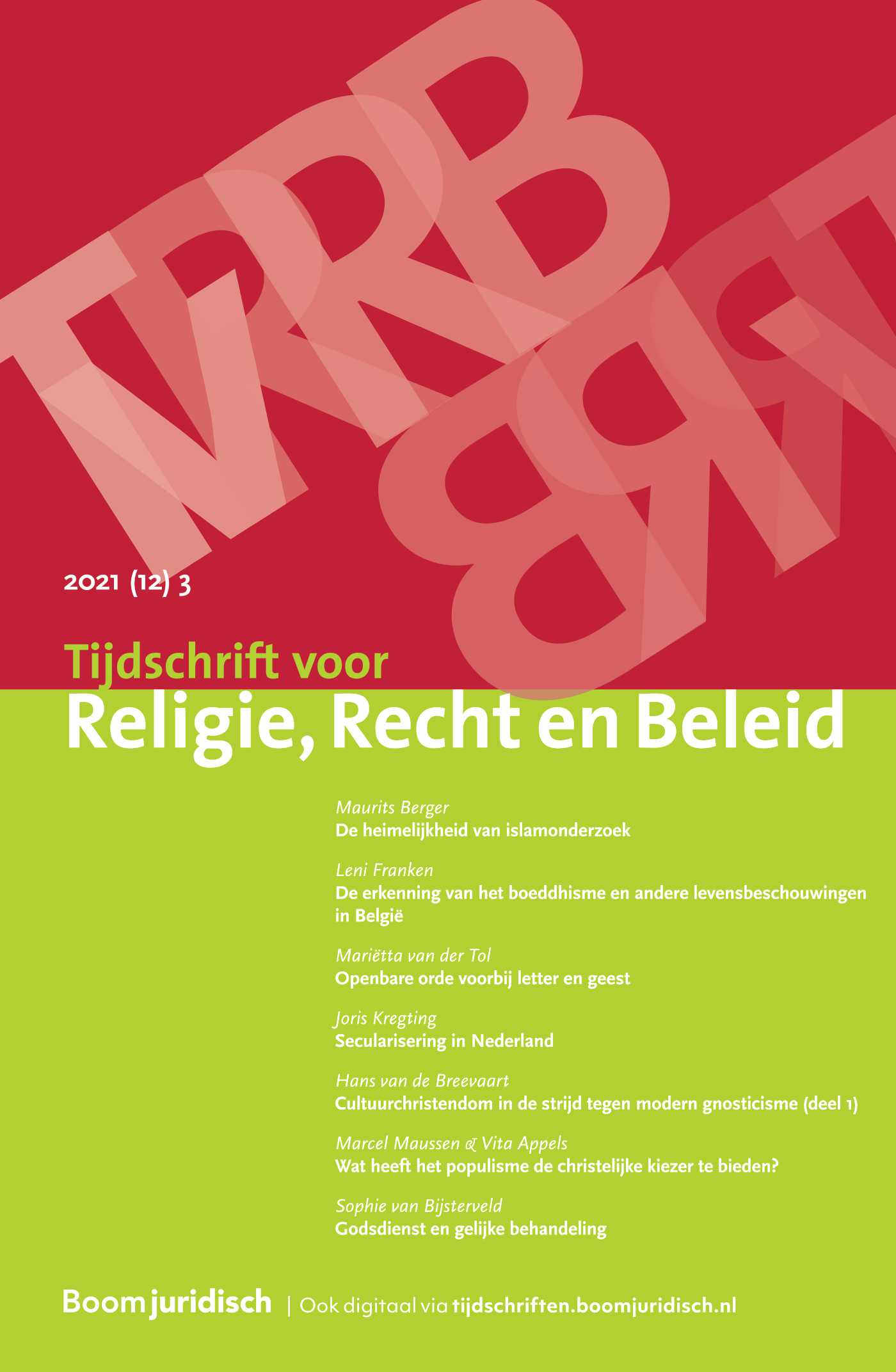|
Since 30 years the Netherlands’ government practises an integration policy towards ethnic minorities. From the beginning, this comprehensive approach is challenged by demands of immigrated religious communities, e.g. the erection of buildings of worship. For the government, religion is an influential circumstance, not an object of the policy-making process. Therefore religious matters deserve political attention.The mid-nineties of the twentieth century brought the Islam into the focus of national policy. The first issue concerned the appointments on a temporary basis of Turkish imams by the Turkish authorities. That evoked the need for a Dutch training-school in order to be prevented from further admissions from abroad. In the meantime, compulsory introductory courses for religious leaders with a non-EU- or EEA-nationality were introduced. Since nine-eleven, the threats of Islamic ultra-orthodox tendencies dominate the political discourse. |


Tijdschrift voor Religie, Recht en Beleid
Meer op het gebied van Algemeen
Over dit tijdschriftMeld u zich hier aan voor de attendering op dit tijdschrift zodat u direct een mail ontvangt als er een nieuw digitaal nummer is verschenen en u de artikelen online kunt lezen.
| Redactioneel |
|
| Auteurs | Maurits Berger |
| Auteursinformatie |
| Artikel |
|
| Trefwoorden | etnische minderheden, immigratie, integratiebeleid |
| Auteurs | Ben Koolen |
| SamenvattingAuteursinformatie |
| Artikel |
|
| Trefwoorden | secularisatie, engagement, kerk, spiritualiteit |
| Auteurs | Joep de Hart |
| SamenvattingAuteursinformatie |
|
In the Netherlands today secularisation essentially amounts to the declining influence of church life and to religious individualization. The churches remain important as a source and inspiration for social engagement. The precarious position of the mainline churches raises concern about the erosion of bridging social capital: the social relationships between people who differ in many respects. |
| Artikel |
|
| Trefwoorden | Commissie gelijke behandeling, handenschudden, gewetensbezwaarde trouwambtenaar, rechter |
| Auteurs | Hans-Martien ten Napel |
| SamenvattingAuteursinformatie |
|
The opinions of the Dutch Equal Treatment Commission (CGB) in religious cases have been followed only partially by the courts. Thus from two judicial rulings on the shaking of hands by Muslims, an interesting difference in approach with the CGB becomes clear. Although it agrees with elements of the reasoning by the CGB, amongst others the Dutch Administrative High Court in contrast with the CGB puts uniformity above diversity with respect to this way of exchanging greetings. However, one can live with this difference in outcome, since in the past the CGB itself took the same approach of uniformity in the subject-matter. As it does today with respect to Christian registrars who refuse to conduct same-sex marriages. |
| Artikel |
|
| Trefwoorden | vrijheid van godsdienst, laïcité, bijzonder onderwijs, verhouding kerk en staat |
| Auteurs | Aernout Nieuwenhuis |
| SamenvattingAuteursinformatie |
|
Civil servants wearing religious symbols, state subsidies for religious communities and several other questions concern the structural relationship between state and religion. In Germany and France, the Constitution sets forth the nature of this relationship. In the Netherlands, references are usually made only to freedom of religion and the principle of equality. This article analyzes whether specific norms may be formulated in order to solve the aforementioned questions in the Netherlands. |
| Jurisprudentie |
|
| Trefwoorden | belediging, Geert Wilders |
| Auteurs | Maurits Berger |
| Samenvatting |
|
In March 2009 the Dutch Supreme Court reconfirmed that insulting a religion is in itself not a criminal offense equal to discrimination of, or incitement of hatred vis-a-vis the adherents of that religion. Interestingly, two months earlier, the Amsterdam Court of Appeal in the case against the parliamentarian Geert Wilders, ruled that insulting a religion may very well constitute an insult of its believers. This article is an analysis of the Amsterdam ruling and a discussion of the argument in favor and against the equation of insulting religion with insulting believers, based on the case law of the European Court of Human Rights. |
| Jurisprudentie |
|
| Trefwoorden | kruisbeeld, godsdienstvrijheid |
| Auteurs | Carla Zoethout |
| SamenvattingAuteursinformatie |
|
The compulsory display of the crucifix in the classrooms of State schools restricts the right of parents to educate their children in conformity with their convictions, and the right of children to believe or not to believe. The Court concludes, unanimously, that there has been a violation of Article 2, First Protocol European Convention of Human Rights (the right to education, taken jointly with Article 9 of the Convention (the freedom of religion). |
| Recent |
|

 Aflevering 3
Aflevering 3